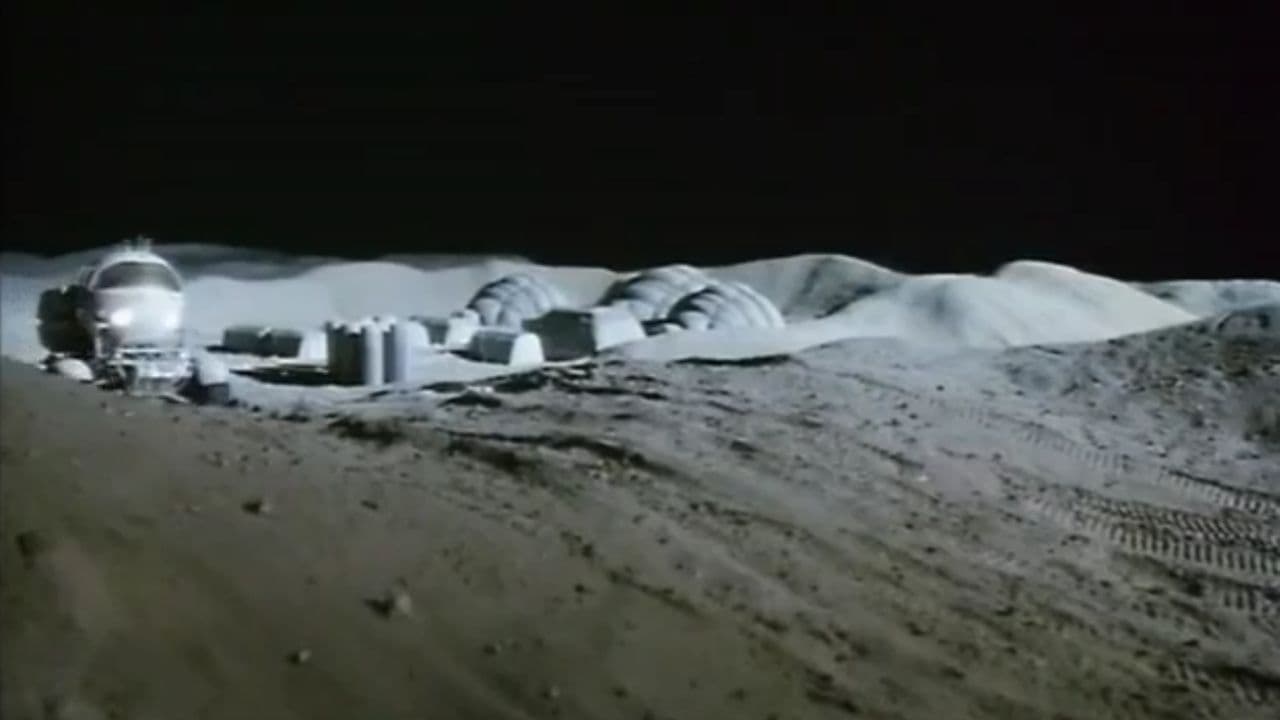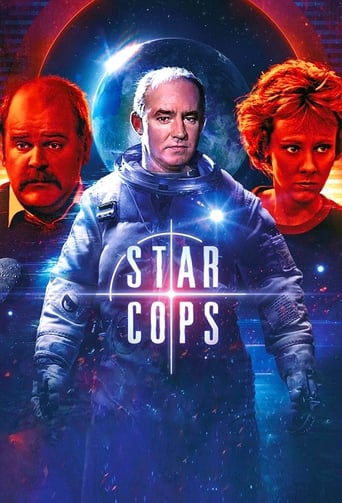Organnall
Too much about the plot just didn't add up, the writing was bad, some of the scenes were cringey and awkward,
Catangro
After playing with our expectations, this turns out to be a very different sort of film.
Orla Zuniga
It is interesting even when nothing much happens, which is for most of its 3-hour running time. Read full review
Wyatt
There's no way I can possibly love it entirely but I just think its ridiculously bad, but enjoyable at the same time.
Muldwych
Star Cops was a brilliant fusion of speculative and crime fiction unfortunately cut down in its prime. The nine episodes it does have to show for itself are well worth your time, engagingly portraying as they do a pretty credible look at what life might be like a couple of decades from now when mankind takes its first steps into space and establishes a permanent presence there. In the new frontier, where the laws have yet to be codified and the interests of corporations and rival governments can be pursued without consequence, Earth-bound authorities soon realise the need for a dedicated police force to be stationed where the action is. Seasoned terrestrial detective Nathan Spring is sent skyward to take charge of this very first attempt at extraterrestrial law enforcement - disparagingly nicknamed the Star Cops. With a team comprising members from across the globe, the Star Cops discover that while the base motivations for things like murder, espionage, kidnappings and fraud are little different in zero gravity, the rapidly different environment in which they take place and the technology affording extraterrestrial habitation allow them to be conducted in a variety of new ways, from sabotaging space suits or atmospheric decompression to alien hoaxes. It's far easier to make people disappear, far simpler to traffic drugs and far harder to receive any help when it's millions of kilometres away.The show is a genuine attempt at speculative fiction based on real-world foundations, making it more Doomwatch than Doctor Who, the former based around extrapolations of the real science of the day. Meanwhile, the production team constructed models and sets that didn't stray too far from what we are rapidly seeing in the space stations of today and perhaps the moonbases of tomorrow. Help was even supplied by the McDonnell Douglas Corporation (now part of Boeing) to incorporate real flight simulators, giving the series that extra touch of authenticity. Actors were suspended on wires to simulate weightlessness, though in time, dramatic license prevailed - it's hard to look dignified when you're floating. An excellent cast headed by David Calder breathed life into the disparate characters who initially take time to trust each other, but bonds are developed even over the short span of the series.The show was not without its faults, some of which are only more evident in our more politically-correct age. Sexism, particularly on the part of Colin Devis, the rough, slightly misogynistic, but nonetheless caring and likable detective inspector hired by Spring in episode 2. While such behavior is even less likely to be tolerated in 2027, when the action takes place, it does at least underscore the fact that Star Cops was not meant to be Star Trek - this was not the enlightened 23rd Century. Equally more jarring today are the racial stereotypes - the Americans are cowboys, the Italians are all in the mafia, the Japanese are excessively polite, and so on. It's a welcome indicator of at least one way in which television has progressed in the decades since - even if the actual content hasn't. None of this however greatly detracts from all the things Star Cops gets right - solid storytelling, and great characterisation. Humanity is at the core of the series, good and bad.Unusually for a series of this nature, the incidental music is neither synthesised nor orchestral, but rock-based, through the talents of Moody Blues frontman Justin Hayward, who himself sings the theme tune. You'll find it hard to meet someone who thought any of this was a good idea (not even the show's creator), but I'll go at least halfway by saying that I do like the theme, though 80s rock instrumentals do not work to underscore the drama any more than 'Yakkety Sax' would work in a documentary about the First World War. However, I applaud experimentation - Evan Chen's unusual score for 'Crusade' was a far better attempt at something completely different.Star Cops is generally considered to have failed due to conflict behind the scenes, constant rescheduling by the BBC and its inability to find an audience: it wasn't 'ET' enough for sci-fi fans and too much so for lovers of crime fiction. It was an attempt at something new, which didn't sit well with a Britain that had in the late 80s grown tired of what they considered sci-fi to be (now that opinions have turned 180 degrees, maybe it's time for someone to carry on where the series left off). The title itself doesn't help either, bringing to mind images of ray guns and spandex. Trust me - you won't come across any of that here. All of which is a great shame, and as time has passed, it's become more favourably re-appraised. I certainly give it the thumbs up and recommend it to the curious.
Theo Robertson
I remember when STAR COPS was schedulded to be broadcast in 1987 we saw the sort of hype that also greeted the BBC`s recent crime drama HUSTLE , possibly the most hyped show in the BBC`s history . Strange then that STAR COPS was shown on BBC2 at 8.30 on weekday evenings at the height of Summer . I did think someone high up at the BBC didn`t want this show to succeed .
But I think the reason for its failure lies in the hands of the production team . Anyone heard of Chris Boucher ? He`s the former script editor of BLAKE`S 7 and creator of this show which led me to believe we`d be seeing some gritty dramatic SF show , but we didn`t . Look at the show`s title STAR isn`t the operative word , COPS is and Boucher has created a show that is just another crime drama using the gimmick of having it set in space . People get killed outside the Earth`s orbit and it`s up to this London cop and his multinational colleagues to solve the crimes which are usually commited by the mafia or greedy corporate companies Sorry to be cynical since a lot of people on this page seemed to have enjoyed it but even the gimmick of having this show set in space doesn`t stop it from being nothing less than a pretty dire crime series . It`s supposed to be set in the late 21st century but do we find out what 21st century Earth looks like ? No because everything is filmed inside an office or a restaraunt and if there`s any outside location work done the script is specifically written so that it will take place in a park so that the BBC won`t have to break the bank with convincing set designs
We won`t be seeing a second series of STAR COPS but we will be seeing a new series of DOCTOR WHO next year which should restore the BBC`s reputation as being the prime server of quality sci-fi
john-994
Star Cops rose above the average in a way that rarely happens: by being more average. How was this? Well, from the start, it's so average, it's. different! It had average theme music - well average for something other than SF. Kind of laid back. Style wise, in the SF arena, it has only recently been matched by the rather less pleasantly warbling intro for the appalling 'Enterprise'. Very laid back.Acting wise, everyone does a competent job. David Calder is a high point but none of the rest are Patrick Stewart. But they don't need to be. They seem to be either actors playing hard at being `regular Joe's' or - failing that - they're just fairly average actors. Either way, it doesn't seem to matter. The actors play 'space' like it's no big deal. Like they don't want to be there but do want to do their jobs. Even when they are only just on the ball, it's still terribly convincing because it all looks so 'run of the mill'.The plots aren't overly clever or dramatic. They don't involve saving the earth every week. No vast alien flotillas hove into view to crush all resistance before them. No labyrinthine plots of shape shifters or invisible aliens. Just regular greedy, lazy people and average nut cases doing what they do in the real world: being avaricious, slack and mad - just, it's in orbit! (well, or on the moon as well).The effects show nice attention to detail but are pretty run of the mill BBC fare. So they're 'effects' but not 'special effects', if you see what I mean, but it's enough. The modelling's quite nice and pretty believable. The script never gets caught up in easy to film stuff like artificial gravity (except the spin on the space station Ronald Regan!), or plot accelerators like faster than light drives.I know this may sound stupid but, the mix of accents, the run of the mill mundanity. I love it! Why doesn't someone bring it out on DVD or - at least - show the thing on the TV again!
possum-3
No matter how many times I think about it, 'Star Cops' is still quite possibly the greatest science-fiction show ever on television.The premise is simple--cops in space, something that sounds like a recipe for schmaltz, but it's the execution that makes it rise head and shoulders above the capsule description. The characters, through the space of nine episodes, show more depth and range than a decade of latter-day 'Star Treks'. They have moments of irritability, seething rage, intense fear, mild annoyance and sheer terror, played out over plots that challenge the viewer to keep up. This is a show that improves exponentially with repeated viewings, with complexities opening up and incidental moments gaining significance as you become able to correlate them. The characters are often unlikeable, quarrelsome, and rude--much like real people.Dialogue is sometimes cryptic, requiring another viewing for you to understand the joke or the significance of the remark. Often, characters speak over each other's lines, much like real people.The plots, while often standard mystery fare, offer spins new to the science-fiction format, requiring a little knowledge of human nature rather than of physics or chemistry. It's never the science, or a simple whodunit--it's always the motive. The human element is always what is at issue.And NO SF SHOW has ever been so firmly within the possibilities of REAL SCIENCE, requiring no long explanations or technobabble justifications. It is, without a doubt, the most scientifically probable program that has ever been on the air.There are only nine episodes, and that's a pity. Blame the BBC for their infinite lack of wisdom. But at least there are NINE, and that's wonderful.

